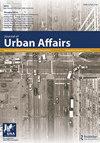Health and employment among young adults receiving federal housing assistance
IF 1.9
3区 经济学
Q2 URBAN STUDIES
引用次数: 0
Abstract
ABSTRACTSince the 1980s, the Department of Housing and Urban Development (HUD) has implemented various “self-sufficiency” demonstrations aimed at supporting employment among federal housing assistance clients. A concern associated with these demonstrations is that adults in poor health will be either excluded from these programs or penalized for not meeting program directives to obtain employment. This concern speaks to the ongoing debate about the importance of work barriers—such as poor health—compared to programmatic work disincentives—such as basing rents on income—in shaping the employment outcomes of HUD clients. We advance this debate through a detailed analysis of the relationship between specific health conditions and employment among a sample of young adult HUD clients. Using a novel dataset and quasi-experimental research design, we find that depression, anxiety, hypertension, and diabetes are prevalent conditions among our sample of HUD clients. We further find that depression and hypertension are significant predictors of non-employment, though depression is only significant among HUD clients and not the entire matched sample. We find no evidence that HUD assistance creates a work disincentive. Our results therefore support the narrative that work barriers such as poor health may create a barrier to employment for HUD clients, many of whom may require specialized health and supportive services to obtain employment.KEYWORDS: Affordable housingemploymentpovertyurban health Disclosure statementNo potential conflict of interest was reported by the author(s).Additional informationFundingThis research uses data from Add Health, funded by grant [P01 HD31921] (Harris) from the Eunice Kennedy Shriver National Institute of Child Health and Human Development (NICHD), with cooperative funding from 23 other federal agencies and foundations. Add Health is currently directed by Robert A. Hummer and funded by the National Institute on Aging cooperative agreements [U01 AG071448 (Hummer) and U01AG071450 (Aiello and Hummer)] at the University of North Carolina at Chapel Hill. Add Health was designed by J. Richard Udry, Peter S. Bearman, and Kathleen Mullan Harris at the University of North Carolina at Chapel Hill.Notes on contributorsAtticus JaramilloAtticus Jaramillo is an assistant professor in the School of Landscape Architecture and Planning at the University of Arizona. His work explores how housing policies and programs shape the neighborhood, health, and economic outcomes of low-income adults and children. Other works by Dr. Jaramillo can be found in Journal of the American Planning Association, Housing Policy Debate, Cityscape, and The Social Science Journal.William M. RoheWilliam M. Rohe is a research professor in the Department of City and Regional Planning at the University of North Carolina at Chapel Hill. Dr. Rohe is co-author of Planning with Neighborhoods (University of North Carolina Press), co-editor of Chasing the American Dream: New Perspectives on Affordable Homeownership (Cornell University Press) and author of The Research Triangle: From Tobacco Road to Global Prominence (University of Pennsylvania Press). He has also published over 70 referred journal articles on the topics of housing and community development policy and practice, as well as numerous research reports for federal, state, and local government agencies and major foundations.接受联邦住房援助的年轻人的健康和就业状况
摘要自20世纪80年代以来,住房和城市发展部(HUD)实施了各种旨在支持联邦住房援助客户就业的“自给自足”示范。与这些示威活动相关的一个关切是,健康状况不佳的成年人要么被排除在这些计划之外,要么因不符合计划指示而获得就业而受到处罚。这种担忧反映了正在进行的关于工作障碍(如健康状况不佳)与计划性工作障碍(如基于收入的租金)在塑造HUD客户就业结果方面的重要性的争论。我们通过详细分析特定健康状况与就业之间的关系,在年轻成人HUD客户样本中推进这一辩论。使用新颖的数据集和准实验研究设计,我们发现抑郁,焦虑,高血压和糖尿病是我们HUD客户样本中的普遍疾病。我们进一步发现抑郁和高血压是不就业的显著预测因素,尽管抑郁仅在HUD客户中显著,而不是整个匹配样本。我们没有发现任何证据表明住房和城市发展部的援助造成了工作积极性的下降。因此,我们的研究结果支持这样一种说法,即健康状况不佳等工作障碍可能会对HUD客户造成就业障碍,其中许多人可能需要专门的健康和支持性服务才能获得就业。关键词:经济适用房,就业,贫困,城市健康披露声明作者未报告潜在的利益冲突。本研究使用的数据来自Add Health,由Eunice Kennedy Shriver国家儿童健康与人类发展研究所(NICHD)的拨款[P01 HD31921] (Harris)资助,其他23个联邦机构和基金会合作资助。Add Health目前由Robert A. Hummer领导,由北卡罗来纳大学教堂山分校的国家老龄化研究所合作协议[U01 AG071448 (Hummer)和U01AG071450 (Aiello和Hummer)]资助。Add Health是由北卡罗来纳大学教堂山分校的J. Richard Udry、Peter S. Bearman和Kathleen Mullan Harris设计的。作者简介:atticus Jaramillo是亚利桑那大学景观建筑与规划学院的助理教授。他的作品探讨了住房政策和项目如何塑造低收入成人和儿童的社区、健康和经济成果。Jaramillo博士的其他作品可以在《美国规划协会杂志》、《住房政策辩论》、《城市景观》和《社会科学杂志》上找到。William M. Rohe是北卡罗来纳大学教堂山分校城市与区域规划系的研究教授。罗博士是《社区规划》(北卡罗莱纳大学出版社)的合著者,《追逐美国梦:负担得起的住房所有权的新视角》(康奈尔大学出版社)的合著者,《研究三角:从烟草之路到全球知名》(宾夕法尼亚大学出版社)的作者。他还发表了70多篇关于住房和社区发展政策和实践的参考期刊文章,以及为联邦、州和地方政府机构和主要基金会撰写的大量研究报告。
本文章由计算机程序翻译,如有差异,请以英文原文为准。
求助全文
约1分钟内获得全文
求助全文
来源期刊

Journal of Urban Affairs
URBAN STUDIES-
CiteScore
5.40
自引率
4.80%
发文量
156
期刊介绍:
Focusing on urban research and policy analysis, the Journal of Urban Affairs is among the most widely cited journals in the field. Published for the Urban Affairs Association, the journal offers multidisciplinary perspectives and explores issues of relevance to both scholars and practitioners, including: - Theoretical, conceptual, or methodological approaches to metropolitan and community problems - Empirical research that advances the understanding of society - Strategies for social change in the urban milieu - Innovative urban policies and programs - Issues of current interest to those who work in the field and those who study the urban and regional environment
 求助内容:
求助内容: 应助结果提醒方式:
应助结果提醒方式:


